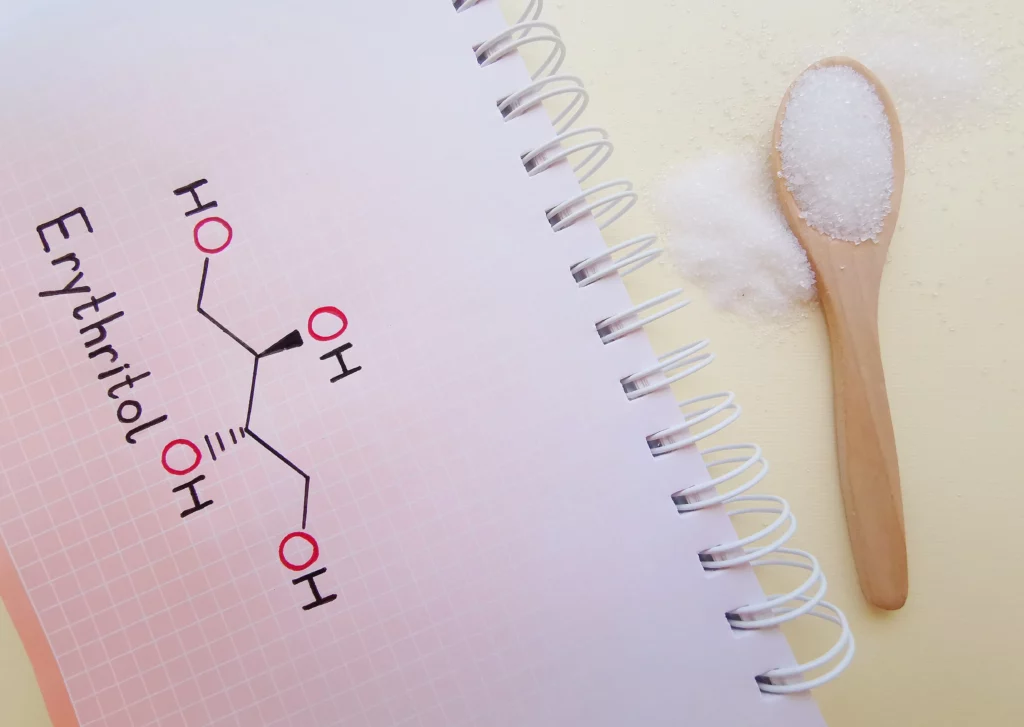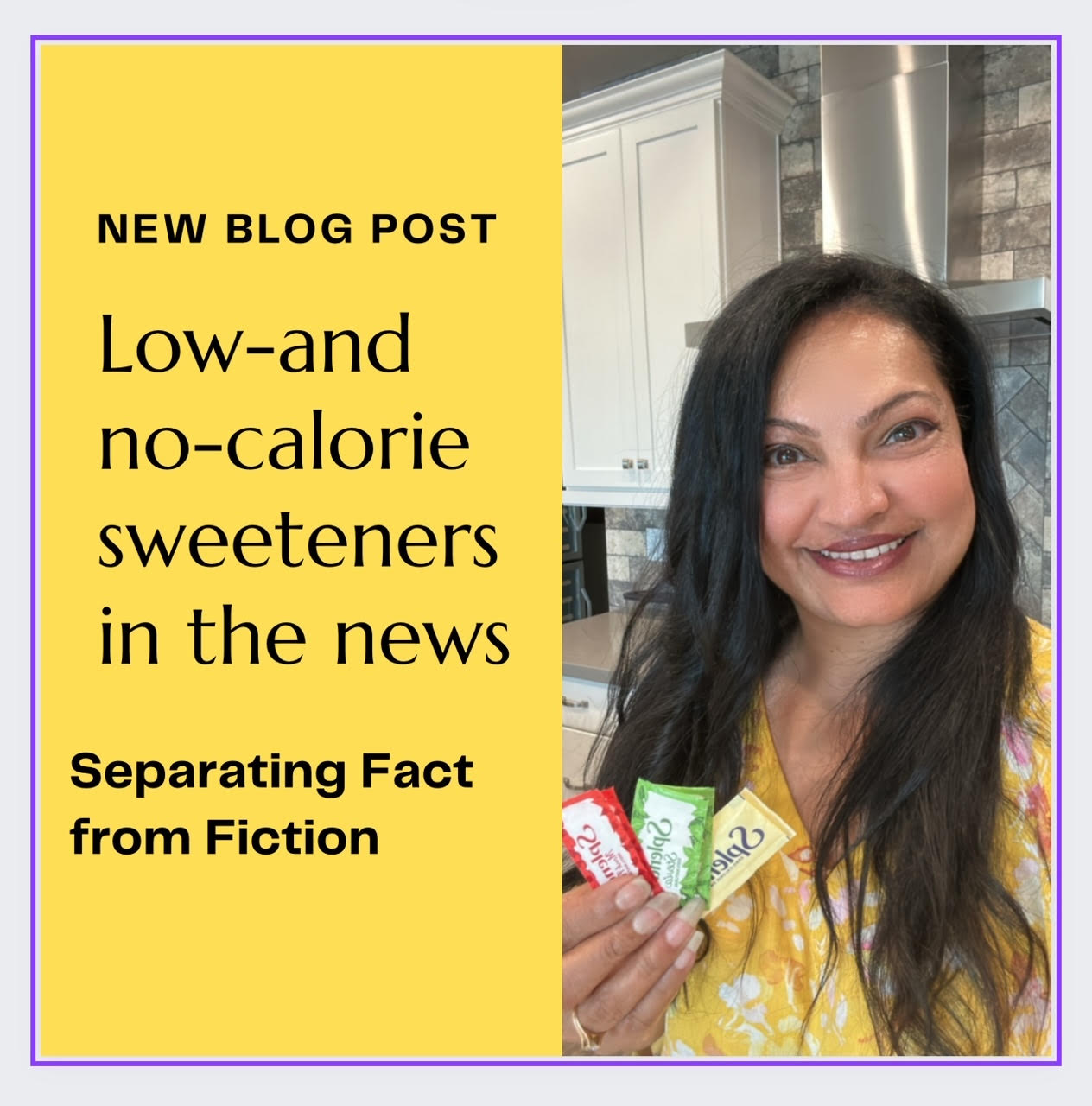This post is sponsored by Heartland Food Group. However, all the opinions and thoughts presented are my own.
As a seasoned dietitian and diabetes care and education specialist, many of my client conversations are about how you can enjoy some of your favorite foods without negatively affecting your health. Low- and no-calorie sweeteners and their safety are especially important to my clients with prediabetes and diabetes. This blog provides evidence-based information and helps separate fact from fiction to address some of the confusion.
What are low- and no-calorie sweeteners?
Low- and no-calorie sweeteners (LNCS) are highly concentrated sweet substances that are significantly sweeter than table sugar. They provide sweetness when added to foods and beverages without the added calories that come from sugar.

Common Types of Sweeteners
LNCS can broadly be categorized into three categories:
1. Sweeteners as food additives
- Aspartame
- Saccharin
- Sucralose
2. Plant-based sweeteners
- Steviol Glycosides (Stevia)
- Luo Han Guo (Monk fruit)
3. Others
- Sugar alcohols
- Sorbitol
- Mannitol
- Xylitol
- Erythritol
- Rare Sugars
- Allulose
They each have a different sweetness intensity compared to table sugar and have different properties in terms of dissolving in liquids, heat tolerance, etc. It is best to choose one based upon your preference and how you will use it.
Sweeteners: Separating Facts From Fiction
What has the media said about LNCS and what does the science say? Let’s dig into some of the most frequently asked questions about LNCS, specifically Splenda (sucralose) and erythritol.
Is Splenda (Sucralose) bad for you?
Here’s what we do know. LNCS including Splenda are rigorously researched and globally endorsed by reputable agencies like the FDA for safety. The FDA reviewed over 110 scientific studies before approving sucralose.

Is Splenda bad for your gut? Does Splenda cause DNA damage? How about cancer?
A study claimed that sucralose-6-acetate (S6A) is present in commercial sucralose samples. Additionally, it suggested that after sucralose consumption, S6A is generated in levels capable of causing
DNA damage, gene damage, or genotoxicity. These statements are incorrect. The article lacks scientific validity, and its findings do not impact Splenda’s safety. Also, Splenda Brand products do not include S6A.
The National Cancer Institute emphasizes that numerous studies show no evidence linking sucralose to cancer in humans.
Is erythritol bad for you and does erythritol cause heart attacks?
Research conducted in February 2023 suggests that higher levels of erythritol in the bloodstream may elevate the risk of heart attack and stroke. However, it’s important to recognize that this was an observational study, which means that it cannot establish dietary erythritol as a cause of heart attack and stroke. The authors only included individuals who were already at increased risk for cardiovascular events, so they are not representative of a normal population. Those under cardiovascular stress naturally produce more erythritol, and the study did not differentiate between dietary erythritol and erythritol produced by the body.
More extensive research is needed to thoroughly comprehend the cardiovascular risks associated with long-term erythritol use. We do know that global regulatory agencies have reviewed the safety of erythritol, and it is approved for use in more than 60 countries around the world.

The World Health Organization Guidance on Non-sugar Sweeteners Compared to Sensationalized Media Headlines
Media story headlines stated “World Health Organization warns against use of non-sugar sweeteners.” However, here’s what the WHO guidance said and what you need to keep in mind as you look at these headlines.
The WHO provides a conditional recommendation discouraging the use of non-sugar sweeteners (NSS) for weight management or mitigating the risk of noncommunicable diseases.
The advice is based on a review that didn’t provide very strong evidence about the effects of consuming more or less non-sugar sweeteners on health. Due to potential factors like participants’ initial health conditions and varied patterns of NSS use potentially influencing the observed link between NSS and disease outcomes, the guidance is marked as conditional.
As the focus of this guideline was not on studying the effects of NSS use in individuals with diabetes, research specifically targeting or including only those with pre-existing diabetes was not part of the review.
The advice given in this guideline doesn’t come from toxicological evaluations of the safety of individual NSS. It’s not meant to update or replace safety guidelines regarding recommended or maximum consumption levels established by authoritative bodies like the Joint Food and Agriculture Organization of the United Nations (FAO)/WHO Expert Committee on Food Additives (JECFA) or similar organizations.
The guidelines discouraging the use of NSS (another name for LNCS) for managing weight and reducing the risk of chronic diseases like diabetes miss the primary motivations behind people’s choice of these additives. Scientific research strongly affirms the safety and effectiveness of LNCS.
The Bottom Line on Low- and No-Calorie Sweeteners
Low- and no-calorie sweeteners stand out as extensively researched ingredients on a global scale. A wealth of high-quality scientific evidence supports their safety and endorsement by health and regulatory agencies across the globe, including the FDA.
Scientific research is unequivocal: Low- and no-calorie sweeteners (LNCS) aren’t magical fat-burning or energy-boosting agents and don’t inherently enhance overall health. LNCS are neutral—neither inherently good nor bad—so they don’t determine a product’s healthfulness.
The scoop on LNCS is this: While consuming LNCS isn’t necessary for good health, they present a safe choice for those seeking to trim calories, carbohydrates, and added sugars without compromising a sweet flavor.
These sweeteners play a pivotal role in addressing the prevalent global epidemics of obesity and diabetes, aiding in weight management and blood sugar level regulation.
In the United States, where over 80% of the population grapples with overweight, obesity and/or diabetes, LNCS offer a viable sugar alternative, helping individuals sidestep adverse health effects, notably blood sugar spikes.
Moreover, they serve as vital tools for food companies, facilitating the reformulation of products to reduce calories and added sugars.
References:
International Sweeteners Association. (2023). Safety & regulation. https://www.sweeteners.org/safety-regulation/
International Food Information Council. (2023, January 3). Are Low-and No-Calorie Sweeteners Safe? https://foodinsight.org/facts-about-low-calorie-sweeteners/
Calorie Control Council. (2023, June 29). WHO guidelines on Non-Sugar sweeteners.
https://caloriecontrol.org/health-benefits-established-safety-of-low-and-no-calorie-sweeteners-supported-by-decades-of-experience/
Centers for Disease Control and Prevention. National Diabetes Statistics Report. Updated January 18, 2022. Accessed September 18, 2023. https://www.cdc.gov/diabetes/data/statistics-report/index.html
Rogers PJ, Appleton KM. The effects of low-calorie sweeteners on energy intake and body weight: a systematic review and meta-analyses of sustained intervention studies [published correction appears in Int J Obes (Lond). 2021 May 27;:]. Int J Obes (Lond). 2021;45(3):464-478. doi:10.1038/s41366-020-00704-2
Nichol AD, Holle MJ, An R. Glycemic impact of non-nutritive sweeteners: a systematic review and meta-analysis of randomized controlled trials. Eur
J Clin Nutr. 2018;72(6):796-804. doi:10.1038/s41430-018-0170-6
Johnston CA, Stevens B, Foreyt JP. The Role of Low-calorie Sweeteners in Diabetes. Eur Endocrinol. 2013;9(2):96-98. doi:10.17925/EE.2013.09.02.96
Schiffman SS, Scholl EH, Furey TS, Nagle HT. Toxicological and pharmacokinetic properties of sucralose-6-acetate and its parent sucralose: in vitro screening assays. J Toxicol Environ Health B Crit Rev. 2023;26(6):307-341. doi:10.1080/10937404.2023.2213903
Witkowski M, Nemet I, Alamri H, et al. The artificial sweetener erythritol and cardiovascular event risk. Nat Med. 2023;29(3):710-718. doi:10.1038/s41591-023-02223-9
Use of non-sugar sweeteners: WHO guideline. Geneva: World Health Organization; 2023. Licence: CC BY-NC-SA 3.0 IGO.
 ! My Indian Table: Quick & Tasty Recipes 📚
! My Indian Table: Quick & Tasty Recipes 📚




